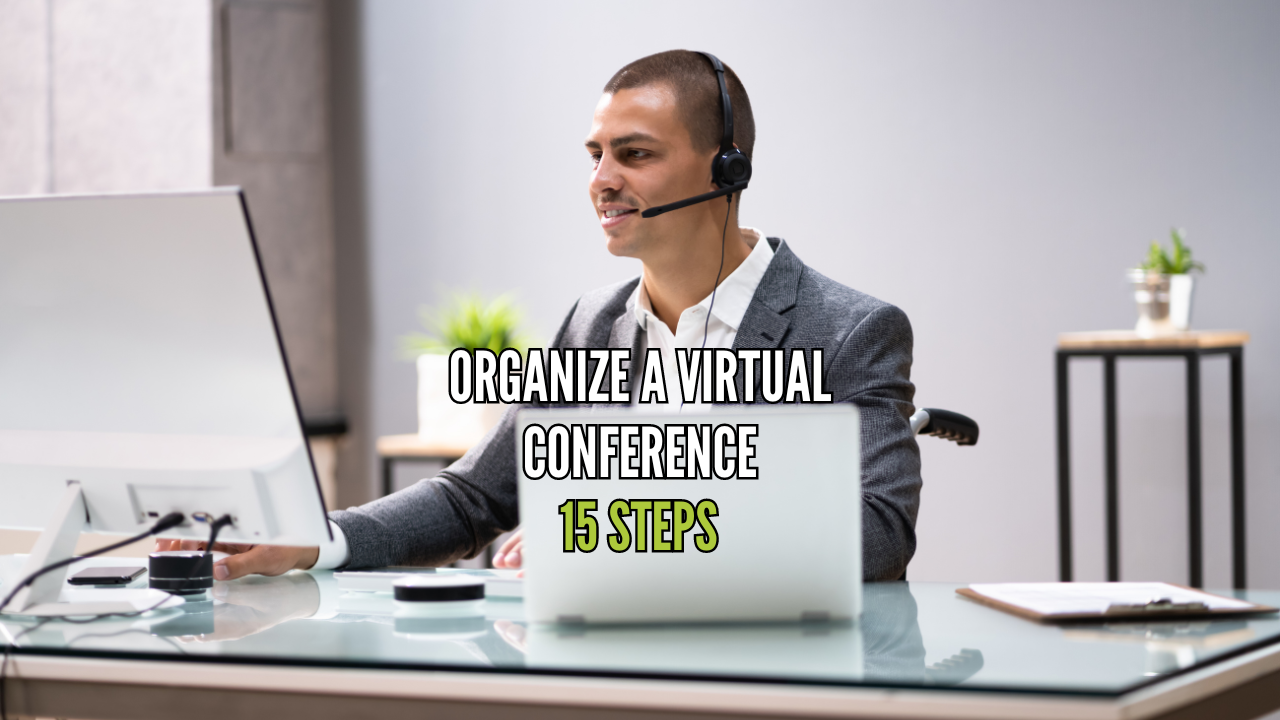
Virtual events have gained popularity due to technological advancements and shifts in communication dynamics with the audience. It’s worth noting that organizing a virtual conference notably circumvents the multiple challenges associated with hosting an event in a physical location (hiring staff, securing suitable venue reservations, arranging coffee breaks, costs related to accommodating guests, among others).
In this article, explore how to successfully organize a digital conference in 15 steps.
Defining Your Objectives
From the get-go, it’s crucial to clearly outline what you expect from such an event. Organizing virtual events can serve:
- To bolster your online authority: Hosting a virtual conference can aid in establishing recognition, positioning you as a reference or a source of pertinent information, thereby increasing visibility.
- To generate revenue: Charging an entry fee for conference participation or selling advertising space, among other strategies, can be lucrative.
Crafting Conference
Content Organizing a digital event involves planning its progression by preparing the content to be offered. Consider your target audience, objectives, and competitive offerings to ensure a unique theme or a distinctive facet of a hot topic that can set your positioning apart.
Selecting an Appropriate Date
Choosing a date should consider the availability of your guest speakers and preferences of your target audience. Effectively managing a digital conference involves selecting a date that allows ample preparation time for everyone and ample promotion of the event.
Choosing the Right Speakers
To successfully organize a conference, inviting experts relevant to your thematic focus is vital. Solicit experienced professionals recognized in their field, capable of engaging with the audience in the digital environment to add value to your event. Collaborating with internationally renowned specialists aids in promoting the conference.
Defining the Sequence and Topics for Speakers
If multiple experts are expected, determining the speaking order and specifying discussion points for each speaker, along with allotted time for each presentation, is essential.
Planning Rehearsals
Rehearsal sessions prevent unnecessary time loss during the conference. They provide insight into potential challenges, allowing you to anticipate and devise solutions.
Choosing the Right Hosting Platform
For effective organization of a digital conference, ensure you select a platform that offers the necessary stability to support a large number of participants simultaneously. Prioritize platforms that support revenue generation, such as in-stream advertising, and offer interactive elements like quizzes, Q&A, and polls.
Ensuring Quality Internet Access
Access to high-quality internet connectivity remains one of the biggest challenges when organizing an online conference. Ideally, you should seek services from a high-speed internet service provider and ensure a valid subscription throughout the conference period.
Choosing Between Live and Pre-Recorded Sessions
Live streaming proves to be much more effective in replacing physical presentations and sessions. Pre-recorded sessions, however, may lack real-time engagement, although this can be compensated in terms of production value, allowing for improvements. It’s up to you to determine what suits your needs best.
Planning for Quality Video Equipment
Organizing a virtual conference also involves ensuring reliable equipment for each speaker. This includes tripods, digital video cameras, screens for transmission with speakers, appropriate lighting equipment, microphones, among other necessities.
Promoting the Conference
Once the previous prerequisites are in place, conference promotion can commence, especially through an email marketing campaign. You can also integrate conference promotion into your content marketing strategy by posting related topics on your social media or website.
Planning Robust Customer Support
Organizing a conference involves ensuring that participants understand the event’s logistics, know when and where to access sessions, and how to access available recordings. Plan navigational links to key information areas on the event’s website.
Developing a Realistic Budget
Purchasing equipment, internet connectivity, renting an online platform, speaker compensation—these are all expenses that must be realistically estimated before the conference.
Seeking Sponsors
To monetize your event, search for sponsors willing to associate with your brand. Compile a list of companies offering products or services related to the conference theme. Governmental or regulatory organizations, non-profit organizations dealing with similar topics—review these structures to find potential event sponsors and propose partnerships to them.
Preparing Post-Conference Tools
Organizing a conference involves forward-thinking by preparing tools to assess the number of attendees from start to finish, survey responses during the conference, etc. Analyzing this data will provide a good indication of the event’s success, enabling you to take measures for better outcomes in the future.
Further read:
- How to get rid of limiting beliefs when you’re a freelancer?
- How to protect your brand, defend it and monitor it?
- 20 of the Best Blogs for Entrepreneurs





